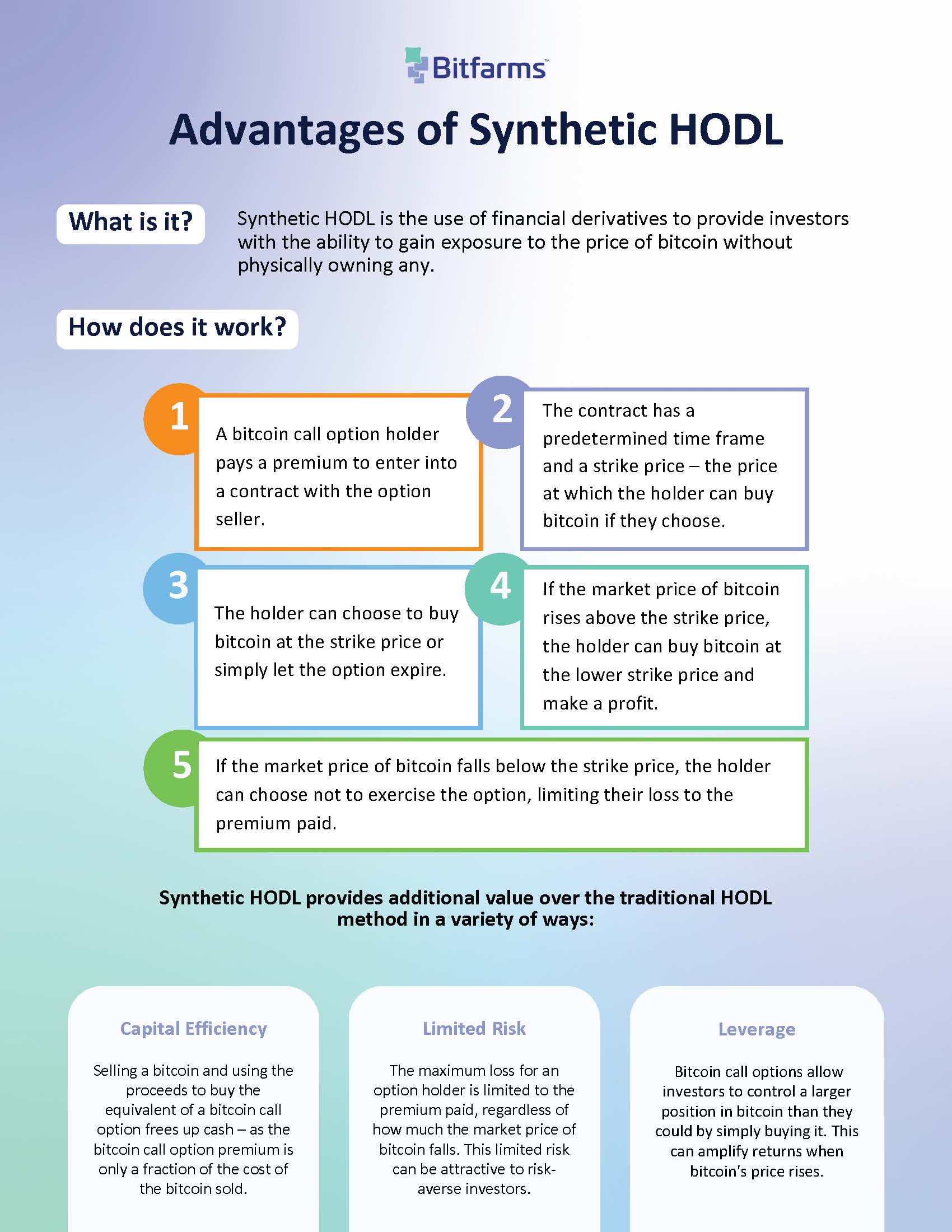Please see the disclaimer at the end of this presentation.
In the ever-evolving world of cryptocurrency and blockchain technology, bitcoin remains a dominant player. With its consistent rise in value and widespread adoption, many investors and companies are exploring innovative ways to leverage their bitcoin holdings. One such strategy is the use of bitcoin call options, a tool that can help individuals and organizations – like Bitfarms – optimize their bitcoin portfolios.
Understanding bitcoin HODLing
HODLing is a popular term in the cryptocurrency space, referring to the act of holding onto an asset, typically bitcoin, for an extended period, with the expectation that its value will increase over time. Many long-term bitcoin investors swear by this strategy, as it has historically yielded substantial returns. However, HODLing also has its drawbacks, such as poor liquidity and missed opportunities to manage risk from price fluctuations.
This is where Synthetic HODL comes into play – offering an alternative approach that combines the benefits of holding bitcoin while allowing for flexibility in optimizing portfolio level risk management.
What is Synthetic HODL?
Synthetic HODL is the use of financial derivatives to provide investors with the ability to gain exposure to the price of bitcoin without physically owning the underlying asset. This method is known as "synthetic" because it mimics the performance of HODLing bitcoin, and they are called "bitcoin call options" because they provide the option to buy bitcoin at a predetermined price at a future date.
Here's how it works:
- A bitcoin call option holder pays a premium to enter a contract with the option seller (often a financial institution such as a market maker).
- The option contract has a predetermined time frame (the contract's duration) and a strike price – which is the price at which the holder can buy bitcoin if they choose to exercise the option.
- During the contract's duration, the holder can choose to monetize bitcoin at the strike price or simply let the option expire.
- If the market price of bitcoin rises above the strike price, the holder can monetize the contract and realize a profit that is the difference between the market price and the strike price.
- If the market price of bitcoin falls below the strike price, the holder can choose not to monetize the option, limiting their loss to the premium paid.
Advantages of Synthetic HODL
Synthetic HODL provides additional value over the traditional HODL method in a variety of ways:
● Capital Efficiency: The cost of a bitcoin call option is only a fraction of the cost of a bitcoin.
● Limited Risk: The maximum loss for an option holder is limited to the premium paid, regardless of how much the market price of bitcoin falls. This limited risk can be attractive to risk-averse investors.
● Leverage: Bitcoin call options allow investors to control a larger position in bitcoin than they could by simply buying it. This can amplify returns when bitcoin's price rises.
Bitfarms Latest Strategy Update
Although Bitfarms holds a significant amount of bitcoin, Synthetic HODL serves as a valuable complement to our overall HODL strategy. Combining the two HODL strategies enables Bitfarms to manage a more capital-efficient HODL portfolio, composed of bitcoins in custody and bitcoin call options, and where risk management becomes a central focus. This initiative provides Bitfarms' investors with leveraged upside to bitcoin in a manner that complements the bitcoin exposure derived from our mining operations.
The use of financial derivatives benefits more than just our HODL strategy. They help increase Bitfarms' enterprise value in several ways:
● Hedging: Bitfarms can use options to hedge against potential bitcoin price declines, reducing our exposure to market volatility.
● Revenue Generation: Bitfarms can generate additional revenue by selling Synthetic call options on their bitcoin holdings. This income can offset operating costs and help fund our growth projects.
● Liquidity: Bitfarms will increase liquidity in the short-term through bitcoin call options, rather than waiting for selling opportunities during bitcoin price increases.
● Optimizing Bitcoin Holdings: By selectively monetizing options when bitcoin prices are favorable, Bitfarms can optimize our bitcoin holdings and maximize the return on investment.
● Risk Management: Options can help Bitfarms manage the risk associated with our bitcoin holdings, especially in a highly volatile market.
Synthetic HODL call options offer a sophisticated and flexible approach to managing bitcoin holdings. These financial derivatives are not limited to hedge funds and trading firms, but can be equally beneficial for companies like Bitfarms, providing new opportunities to optimize their bitcoin HODL strategies while managing risk effectively.
However, we must remind ourselves that options trading involves its own set of complexities and risks. It is essential to have a deep understanding of the options market and consider consulting with financial professionals or experts – like those on the Bitfarms team – before integrating Synthetic HODL call options into any bitcoin investment thesis. These financial instruments can be powerful tools when used wisely, but they must be purposefully designed and actively risk-managed to have the desired effect.

For more information on Bitfarms, visit www.bitfarms.com.
Disclaimer Regarding Forward-Looking Information:
This blog presentation has been issued as a matter of interest to investors and other followers of Bitfarms Ltd. This presentation contains forward-looking information and Bitfarms cautions readers that forward-looking information is based on certain assumptions and risk factors that could cause actual results to differ materially from the expectations of Bitfarms. Readers should not place undue reliance on forward-looking information. Please refer to those risks set out in the public documents of Bitfarms filed on https://www.sedar.com/. Securities regulators including the Toronto Stock Exchange and Nasdaq have not reviewed the information disclosed in this blog presentation and no securities regulator accepts responsibility for the adequacy or accuracy of this content.